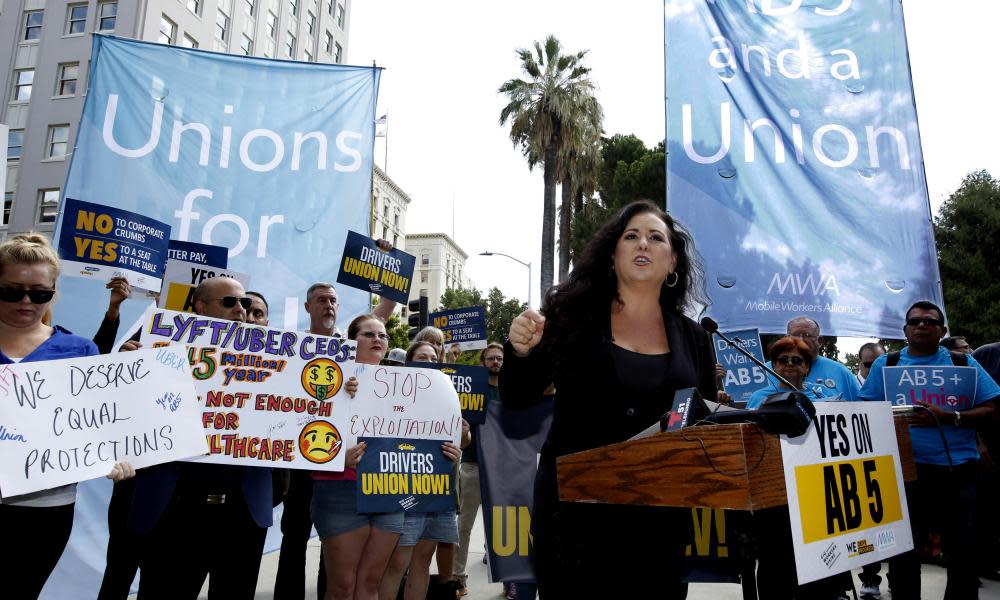Let's follow California's lead and regulate companies like Uber

This week, California’s governor, Gavin Newsom – a darling of tech capitalists – signed Assembly Bill 5 (AB5) into law. The bill codifies the “ABC test” to determine the applicability of California employment laws and makes it harder for companies to get away with misclassifying workers as independent contractors. If properly enforced, AB5 will have enormous impacts for vulnerable workers in the trucking, janitorial and construction industries.
But across the world, the law has been most hailed as a regulatory check on the so-called “gig economy”. Indeed, the International Transport Workers’ Federation (a federation of 665 trade unions representing 18 million workers in 147 countries) has called on this California bill to be the inspiration for regulations governing gig work internationally.
AB5, however, does not reflect a stark legal shift, as its detractors have argued. Rather, the law standardizes the legal test for employee status under California law and gives greater power to city attorneys to enforce laws against companies (like Uber and Lyft) who would probably have been found in violation under past precedent. The test brings clarity for businesses and workers alike and limits the possibility of ideological decision-making.
Could AB5 signal the end of technology apps operating as autonomous legal fiefdoms?
What AB5 does reflect is a profound cultural shift in regulators’ relationship to and understanding of labor platforms. In the first few years of the app-labor frenzy, California’s regulatory approach to gig companies could best be described as either dereliction or negligent tech-bedazzlement.
Just six years ago, state officials were enthralled by the potential of the “sharing economy” to build “community” and “trust”. In 2013, in lieu of enforcing existing taxi regulations against Uber and Lyft, the then San Francisco mayor, Ed Lee, allowed the companies to operate illegally – even launching a “Sharing Economy Working Group” and issuing a proclamation recognizing 13 June as “Lyft Day”.
Later, as gig companies launched in cities across the US, the California Public Utilities Commission (CPUC) became the first state body to authorize these businesses by creating a whole new regulatory category – “Transportation Network Companies” (TNCs). The term rapidly made its way into the lexicon of policymakers the world over. Although Uber and its ilk were building on a business model that had long been decried as exploitative and possibly illegal, the CPUC licensed the companies while remaining curiously silent on the matter of misclassification.
In the period of high unemployment after the Great Recession, the people who flocked to gig work were less interested in building community with strangers and more interested in putting food on the table. But instead of providing secure work and basic benefits like the minimum wage, overtime and workers’ compensation, the gig companies joined an earlier generation of exploitative employers in shifting their business costs and risks on to low-income “independent contractors”.
With the exception of assemblywoman Lorena Gonzalez, the author of AB5 – who attempted to introduce “The California 1099 Self-Organizing Act” in 2016 – state legislators left the glaring labor issues for the courts to figure out. As wages dropped again and again and injured drivers were left out to dry by the companies, the untenable conditions of gig work led workers to sue. In response, Uber and its ilk used a panoply of tactics to avoid a judgment on the matter of employment status. They aggressively litigated and settled lawsuits and used arbitration clauses to undermine the possibility of class actions.
The gig companies’ intransigence, plus regulators’ reticence to enforce existing laws, ultimately enabled AB5. Gig workers in California, frustrated by the impotence of lawsuits and lawmakers, used strikes to grow their power and make their needs heard.
When assemblywoman Lorena Gonzalez introduced this bill – which expanded the reach of a recent California supreme court decision – workers stood behind her and held the line, pushing back against the powerful companies and their watered-down alternative proposals. Through protests, rallies and group trips to Sacramento, labor platform workers and their allies made clear that they needed the same individual rights everyone else got – and maybe more.
California legislators finally got the message: rather than feeling trust and community, many drivers face abuse from and subservience to riders, but cannot respond due to fear of low ratings and “deactivation”. Not only are workers not guaranteed a minimum wage, but in one of the most dangerous occupations in the country, they don’t even have basic protections like workers’ compensation. The assembly speaker, Anthony Rendon, called the gig economy “feudalism all over again”.
Could AB5 signal the end of technology apps operating as autonomous legal fiefdoms? The last six years have proven beyond doubt that labor platform companies need regulation. As we await the passage and enforcement of AB5, we should take note of the incredible shift that has taken place. California lawmakers have signaled a readiness to side with economic equality and fairness, placing limits on previously unassailable tech-capital.
May the world follow.
Veena Dubal is an associate professor of law at the University of California, Hastings

